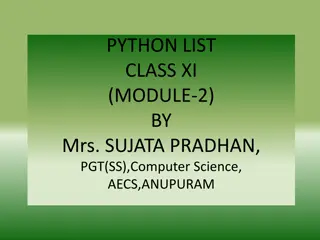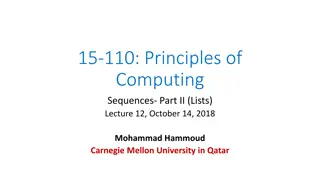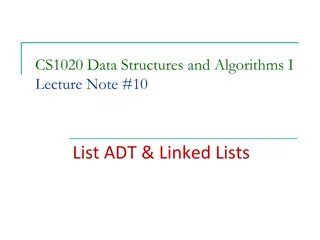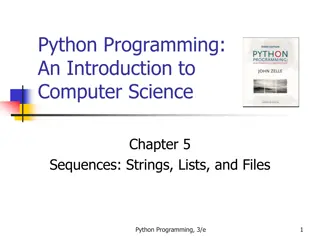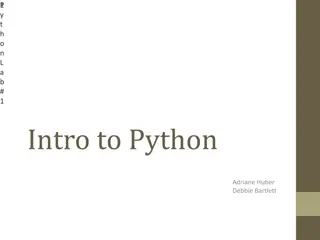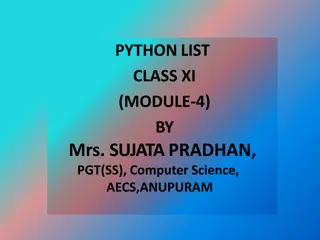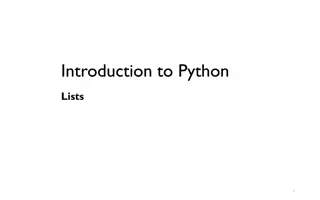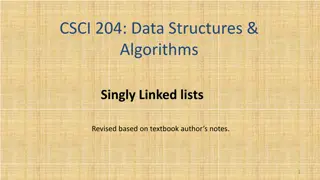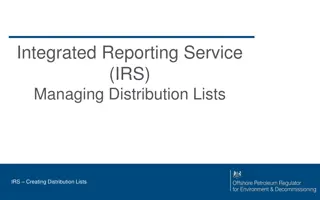
Python Lists: Operations, Examples, and Basics
Explore the world of lists in Python with this comprehensive guide covering list operations, examples, nested lists, and more. Learn how to work with lists, manipulate elements, and utilize various list methods efficiently.
Download Presentation

Please find below an Image/Link to download the presentation.
The content on the website is provided AS IS for your information and personal use only. It may not be sold, licensed, or shared on other websites without obtaining consent from the author. If you encounter any issues during the download, it is possible that the publisher has removed the file from their server.
You are allowed to download the files provided on this website for personal or commercial use, subject to the condition that they are used lawfully. All files are the property of their respective owners.
The content on the website is provided AS IS for your information and personal use only. It may not be sold, licensed, or shared on other websites without obtaining consent from the author.
E N D
Presentation Transcript
LISTS IN PYTHON Peter Larsson-Green J nk ping University Autumn 2018
LISTS Used to store multiple values. Expressions creating lists: [] [] <expr> [ , , ...] <expr> <expr> Expression for retrieving an element from the list: [] <index-expr> <list-expr>
LISTS EXAMPLE my_list = ["a", "b", "c", 4] x = my_list[1] y = my_list[0] z = my_list[my_list[3]-3] # my_list[ 4 -3] # my_list[ 1 ] # "b" w = [0][0] len([3, 7, 4]) 3 [] <index-expr> [] 0 <list-expr> [0] [ ] <expr>
EXAMPLE is_5_in_list([3, 5, 8]) True is_5_in_list([3, 6, 8]) False def is_5_in_list(the_list): i = 0 while i < len(the_list): if the_list[i] == 5: return True i += 1 return False def is_5_in_list(the_list): for element in the_list: if element == 5: return True return False
NESTED LISTS Lists in lists! len([1, [2, 3], 4]) 3 my_list = [ ["a1", "b1", "c1"], ["a2", "b2", "c2"] ] x = my_list[1] y = x[1] z = my_list[1][0] w = [[0]][0][0] [] <index-expr> <list-expr> [] 0 my_list[1] [] 1 my_list [] 0 [[0]][0] [] 0 [[0]]
MORE LIST OPERATIONS Change an element in a list: the_list[<expr>] = <expr> Add an element to the end of a list: the_list.append(<expr>) Remove an element from a list: the_list.remove(<expr>) Remove the element at a specific index in the list: the_list.pop(<expr>) Documentation: help([])
LISTS EXAMPLE my_list = ["a", "b", "c"] my_list[2] = "d" # my_list = ["a", "b", "d"] my_list.remove("b") # my_list = ["a", "d"] my_list.pop(1) # my_list = ["a"] my_list.append("e") # my_list = ["a", "e"]
EXAMPLE get_all_plus_1([3, 6, 8]) [4, 7, 9] def get_all_plus_1(the_list): new_list = [] for number in the_list: new_list.append(number+1) return new_list def sum(a_list): sum = 0 for number in a_list: sum += number return sum
VARIABLES STORE REFERENCES Values in variables aren't copied when used (the reference is!). a = [1] b = a b.append(2) # a is [1, 2]! a = "ab" b = a b = "cd" a = "ab" b = a b = "cd" Name a Value Name a Value Name a Value ab [1 ] , 2 ab cd b b b ab -- cd Variable table. Variable table. Variable table.
LISTS EXAMPLE def multiply_by_two(a_list): new_list = [] for number in a_list: new_list.append(number*2) return new_list def multiply_by_two(a_list): for i in range(len(a_list)): a_list[i] = a_list[i]*2 list = [2, 5] list2 = multiply_by_two(list) list = [2, 5] multiply_by_two(list) # list is [4, 10]!
EXAMPLE def add_to_first(the_list, adder_list): for i in range(len(the_list)): the_list[i] = the_list[i] + adder_list[i] the_list = [3, 4, 5] add_to_first_list(the_list, [1, 2, 3]) # the_list is now [4, 6, 8]
OPERATORS [1, 2, 3, 4] [1, 2] + [3, 4] [1, 2, 1, 2, 1, 2] [1, 2] * 3 True [1, 2] == [1, 2] Pairwise comparison. True [1, 2] < [1, 3] False [1, 2] is [1, 2] a = [1, 2] yes = a is a
USING RANGE TO CREATE LISTS range(5) 0, 1, 2, 3, 4 [0, 1, 2, 3, 4] list(range(5)) [5, 10, 15, 20] list(range(5, 25, 5)) Range can only produce linear sequences. [1, 4, 9, 16] ???????? List comprehension to the rescue!
LIST COMPREHENSION Expression creating a list based on a sequence. [ for variable in ] <expr> <seq-expr> [1, 4, 9, 16] [i*i for i in range(1, 5)] the_list = [] for i in range(1, 5): the_list.append(i*i)
EXAMPLE [50, 51, 52] [i for i in range(50, 53)] [50, 51, 52] list(range(50, 53)) [50, 51, 52] [50+i for i in range(3)]
EXAMPLE words = "one two three four five six".split(" ") [len(word) for word in words] [3, 3, 5, 4, 4, 3]
LIST COMPREHENSION Expression creating a list based on a sequence. [ for variable in if ] <expr> <seq-expr> <expr> [4, 16] [i*i for i in range(1, 5) if i % 2 == 0] the_list = [] for i range(1, 5): if i % 2 == 0: the_list.append(i*i)
EXAMPLE words = "one two three four five six".split(" ") ["_"+word+"_" for word in words if len(word) == 3] ["_one_", "_two_", "_six_"]


